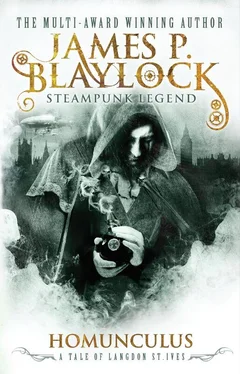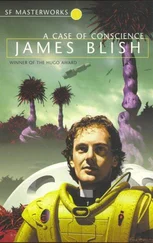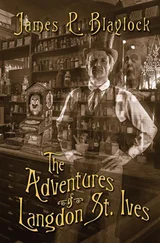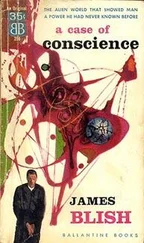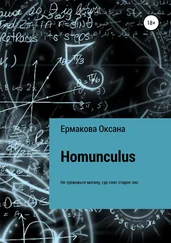James Blaylock - Homunculus
Здесь есть возможность читать онлайн «James Blaylock - Homunculus» весь текст электронной книги совершенно бесплатно (целиком полную версию без сокращений). В некоторых случаях можно слушать аудио, скачать через торрент в формате fb2 и присутствует краткое содержание. Жанр: sf_stimpank, на английском языке. Описание произведения, (предисловие) а так же отзывы посетителей доступны на портале библиотеки ЛибКат.
- Название:Homunculus
- Автор:
- Жанр:
- Год:неизвестен
- ISBN:нет данных
- Рейтинг книги:5 / 5. Голосов: 1
-
Избранное:Добавить в избранное
- Отзывы:
-
Ваша оценка:
- 100
- 1
- 2
- 3
- 4
- 5
Homunculus: краткое содержание, описание и аннотация
Предлагаем к чтению аннотацию, описание, краткое содержание или предисловие (зависит от того, что написал сам автор книги «Homunculus»). Если вы не нашли необходимую информацию о книге — напишите в комментариях, мы постараемся отыскать её.
Homunculus — читать онлайн бесплатно полную книгу (весь текст) целиком
Ниже представлен текст книги, разбитый по страницам. Система сохранения места последней прочитанной страницы, позволяет с удобством читать онлайн бесплатно книгу «Homunculus», без необходимости каждый раз заново искать на чём Вы остановились. Поставьте закладку, и сможете в любой момент перейти на страницу, на которой закончили чтение.
Интервал:
Закладка:
The Kermit Street sewer was badly in need of leveling, for the general sinking of the ground had created long cesspools, the settling water further decomposing what solid ground remained, so that the foundations of houses above cracked and pitched and loathsome sewer gases drifted up into courtyards. But the cesspools which so hampered leveling and flushing had their own value, were the resting place, in fact, for murdered men, not a few of whom had found their way into the sewers with the help of Billy Deener. Their bodies lay mired in offal and garbage and road sweepings emptied down gulley grates, until the corpses swirled at high water into the Thames where, bloated and faceless, they were declared drowned for lack of any sensible alternative.
But the unconscious girl was a different sort of victim. She should, Deener knew, be the one among them to wear the kerchief over her face, but his service to Kelso Drake only stretched so far. The score of minutes she spent below ground wouldn’t hurt her. She wasn’t even conscious of their passing.
When Dorothy awoke, a tearing pain pounding in her head, the cigar-chewing face of the man who had stood in the entry hall of her house arguing with her father smiled down at her, the cigar rolling from side to side as if it were alive. His smile, however, was void of humor or concern for anything but Kelso Drake. She was certain, even in her fuddled state, that it was a smile of loathsome self-satisfaction, empty of anything but falsehood.
It swam out of focus and then back in. She felt awful. There was a horrible stench in the room, the smell of an open sewer, and it seemed to her as Drake materialized before her that it was he who smelled so foul, he or the bent man who stood beside him, squinting at her as if she were some sort of interesting specimen. Then she lost interest in either of the two men, drifting away into herself and the pain in her head. She moved her arm, intent upon touching the hair beside her ear, which, pressed against a pillow, felt clotted with dried blood. She’d been hit on the head. She remembered part of it. Surely, though, this was no hospital. Bits and pieces of memory filtered in, scrabbling around in her mind until they joined like interlocking pieces of a puzzle to form the picture of Jack lying senseless on the pavement of St. James’ Square, of her struggling with a man in a hat, of a woman screaming over and over, of gaping children, of nothing at all after that.
She tried to push herself up onto her left elbow, to swing her right hand at the face before her. But something got in the way. She couldn’t move, was fastened, somehow, secured to the bed by a sheet tied across her shoulders. The cigar face laughed. A hand removed the cigar. The mouth said, “She’ll do nicely — pay us twice over,” and the face laughed again. “Sedate her,” it said, and disappeared from view.
The hunchback loomed over her, a cup full of violet liquid in his hand. The sheet was loosed briefly, and she was yanked onto her elbows by a balding man in a black coat. She hadn’t the strength to fight. She drank the thin, bitter draught, and very soon swam away into darkness.
Langdon St. Ives sawed away at a grilled cutlet that had the consistency of shoe leather. The gray meat lay like a curled bit of tanned hide between a boiled potato and a collection of thumb-sized peas. A sauce — “Andalouse aux fines herbes,” as the hastily drawn menu had called it — was dribbled stingily over the cutlet, the chef careful not to be so liberal as to allow the liquid to pollute the boiled potato. This last, cold as the plate it sat on, sorely needed the sauce, and St. Ives tried with limited success to spoon a bit onto it. But most of what he scraped from the surface of the cutlet merely glued itself to the spoon in a scum of tomato and pepper, leading St. Ives to curse both the quality and the quantity of it. Rationally, he supposed, he should count himself lucky to be faced with such a meager plateful of the wretched stuff, but eating, like anything else, wasn’t a particularly rational business.
He pushed the tiresome plate away, listening to the droning voice of an equally tiresome bespectacled gentleman who sat opposite, tearing into his own cutlet indifferently, as if the act of eating were merely a matter of satisfying bodily processes. He might as well consume a plateful of leaves and twigs. The man spoke to St. Ives as he masticated his veal and peas, chomp chomp chomp, over and over like a machine grinding rock into cement.
“The digestion,” he said, waggling his jaw, “is a tricky business. Gastric juices and all that. It takes a vast quantity of stomach-produced chemicals to break down a lump of sustenance like this pea.” And he held a pea aloft for St. Ives’ benefit, as if the thing were a fascinating little world which the two of them could examine.
“Biology has never been my forte,” admitted St. Ives, who couldn’t abide peas under any circumstances.
The man popped the pea into his mouth and ground it up. “Gallons of bodily fluids,” he said, “produced, mind you, at great expense to the system. Now this same pea reduced to pulp can be readied for evacuation by a tenth amount of gastro-intestinal juices…”
St. Ives stared out the window, unable to look at his plate. He couldn’t work up much enthusiasm for bodily talk. He had nothing against physiology; some of his best friends were physiologists. But it was hardly supper conversation — was it? — all this business about fluids and evacuation. And what was it leading to here? It constituted the friendly sort of banter that preceded really serious discussion — the reason he was once again being fed at the Bayswater Club owned by the Royal Academy of Sciences. With all their powers of scientific perception, thought St. Ives, they ought to be able to see that the supposed veal they were served was in fact a slab of old dairy cow — or worse, a paring of horseflesh, bled pale and bleached with chemicals by the knacker.
No one, however, seemed to be eating save he and old Parsons, whose fellow Academist Lord Kelvin owned a barn in Harrogate alongside his summer house, a barn that, since the debacle of the alien starship, hadn’t any roof. He also, according to Hasbro, owned two dead cows, which had suffered the misfortune of having strayed into the barn minutes before the ship caved in the roof.
And now St. Ives would pay the price. He was in a foul humor — he realized that. First the launching of the craft, then the escape of Willis Pule from the train. The man must have been desperate. It was entirely conceivable that he had leaped to his death in the ditch, an unsatisfying thought altogether. Villains, St. Ives considered, ought to be made to account for themselves. Their demise should be both spectacular and humiliating.
“And the molars of a horse can reduce the most surprising weeds to fortifying pulp in moments,” his host intoned, working at a mouthful of his own surprising foodstuffs. “Now, like a human being, a horse has only a single stomach, but his intestine is phenomenally elongated, adapted to the digestion of coarse forages. This is all a fascinating subject, this business of eating. I’ve spent a lifetime studying it. And I’ve found few things more interesting in the eating line than a workhorse — and of the right sort, mind you. Some sorts of hay are superior due to their effects on the bowel.” He waved his fork proudly, as if to illustrate this last statement, and speared up a row of peas.
St. Ives took advantage of the man’s pausing to yank out his pocketwatch, widening his eyes in alarm, as if he’d just now become conscious of the prodigious passage of time. But his intended attempt to hurry the end of the engagement disappeared into a lecture on the bacterial manifestations of intestinal debris. The man paused some few minutes later to drain a great tumbler of distilled water before him, the cleansing effects of which would “leach away poisons,” not at all unlike the exemplary workings of a well-constructed sewage system. He smacked his lips over the water. “Staff of life,” he said.
Читать дальшеИнтервал:
Закладка:
Похожие книги на «Homunculus»
Представляем Вашему вниманию похожие книги на «Homunculus» списком для выбора. Мы отобрали схожую по названию и смыслу литературу в надежде предоставить читателям больше вариантов отыскать новые, интересные, ещё непрочитанные произведения.
Обсуждение, отзывы о книге «Homunculus» и просто собственные мнения читателей. Оставьте ваши комментарии, напишите, что Вы думаете о произведении, его смысле или главных героях. Укажите что конкретно понравилось, а что нет, и почему Вы так считаете.
